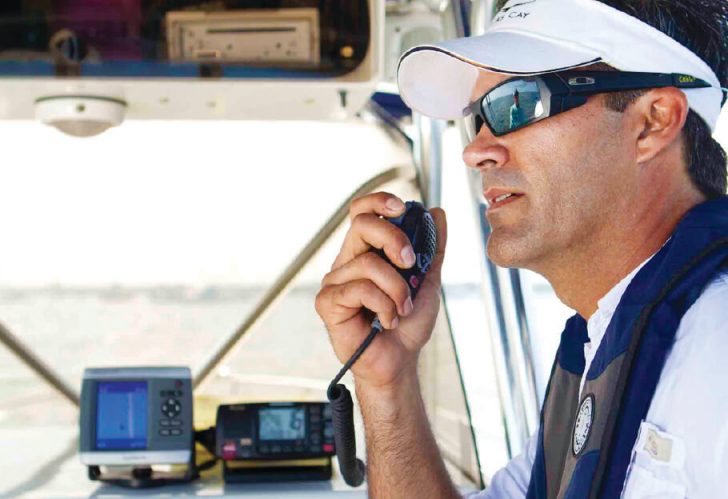Submitted by Sea Tow:
People rarely go anywhere on land without their smartphones anymore, and it has become increasingly common to see boaters using cell phones when they’re out on coastal and inland waters as well. That’s fine—as long as your boat is also equipped with a VHF radio, one of the most important pieces of safety equipment you can have on board.
“Your cell phone could die or you could drop it overboard. We recommend people take a 5-watt handheld VHF along on their boat, at a minimum, to use as their primary form of communication on the water,” said Capt. Ed Schrader, owner of Sea Tow Hampton Roads, Va., which serves the busy waters of Hampton Roads, Virginia Beach, and the Chesapeake Bay area. “It’s better to have a 25-watt VHF mounted at the helm, however.”
Capt. Sammy Royal, the owner of Sea Tow Horseshoe Beach, which covers a rural stretch of the Gulf Coast on Florida’s Panhandle from Waccasassa to Keaton Beach, said boaters can’t rely on their smartphones always “having bars” in his area. “Cell phone service is very limited here. There are small fishing villages along the coast that are nine or 10 miles apart with nothing in between,” he said − making it essential to have a VHF on board.
Another important benefit to using a VHF radio rather than a cell phone is that if you ever find yourself needing assistance, more than one listener can hear and respond to your call for help. “With a VHF, you are able to communicate with more people quickly on the water. Whether it’s Sea Tow, the Coast Guard, or a nearby boater, everybody’s going to hear what you’ve got to say,” said Capt. Schrader, adding, “The USCG’s Rescue 21 System also has VHF direction-finding capabilities and can obtain a relatively good location as soon as you click your mic and place that distress call. This helps greatly if you do not know your location or don’t have time to provide it.”
Of course, a VHF radio can’t help you in an emergency situation if it’s not working properly. Both Captains advise using Sea Tow’s free Automated Radio Check service to quickly and easily check that your boat’s VHF is in operational prior to setting out on the water. To use the service, simply tune the VHF to the local Automated Radio Check channel, key the mic, and request a radio check. You will hear an automated response and then the call will be played back to you, confirming that your VHF radio is working and allowing you to assess transmission strength, a crucial safety check.
Sea Tow Horseshoe Beach offers the Automated Radio Check service on VHF channels 26 and 27. Sea Tow Hampton Roads provides the service on channel 28. To find the Sea Tow Automated Radio Check channel in your boating area, visit https://www.seatow.com/tools-and-education/automated-radio-check.
For more on Sea Tow, an international marine assistance provider, go to www.seatow.com.
